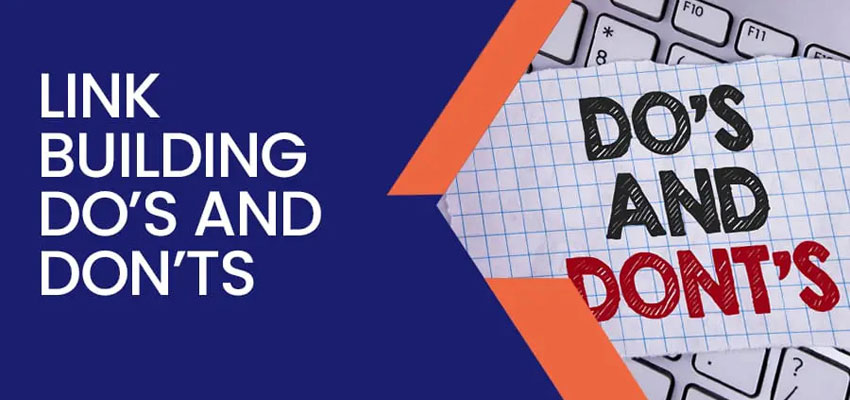
Link building for SEO is one of the main ranking factors of Google, making it extremely important. But it is possible that you could be link building the wrong way by using outdated practices.
If you want to ensure you’re doing it correctly, in order to reap the most benefits, then keep reading to find out which link building tactics still matter and which are a waste of time or downright harmful.
Table Of Contents
Key Takeaways
- Focus on Valuable Links – Prioritize links that bring authority, relevancy, or potential traffic to your site. Avoid links without clear value as they won’t benefit your rankings.
- Leverage Local Listings and Brand Mentions – Ensure your business information is consistent across local listings and create a dedicated page linking to these citations. Reach out to sites mentioning your brand without a link to secure easy link-building opportunities.
- Avoid Spammy Practices – Steer clear of outdated and harmful tactics like buying links, using hidden links, or participating in link schemes. These can lead to penalties and harm your SEO efforts.
The Things You Should Be Doing (The Do’s)
1. Determine The Value Of The Link
Don’t think about ranking for a second, what actual value will that link bring to your website? Is it authority, relevancy, or potential traffic? Weigh up all your options and determine the value of your site. If you can’t see what the value is, then Google won’t either.
2. Local Listings Still Do Well
Local business citations are on a bunch of different platforms, and services such as Moz Local can get you up and running a little bit quicker. They show Google that your business is indeed located where it says it is.
It reveals important business information, such as the address, contact details, etc. When you’re creating your citations, it is important that you be consistent with the formatting of your NAP (name, address, phone number). However, something that isn’t really talked about all that often is that some of these local listings will never be indexed by Google. So, why is that?
If you’re doing business listings, you need to create a page on your business website that says where you can be found online. Then you need to link to those local listings to help Google get that indexed, and it sort of has this boomerang-like effect on your site.
3. Unlinked Brand Mentions
One of the smoothest ways you can gain a link is to figure out who else is talking about your brand or company, but not yet linking to it.
For example, if a business posts an article on “the top SEO companies in the world”, and a business is mentioned, but no link is available, it’s simply a case of dropping a message and asking could they drop in your link as it would be helpful.
They’re mentioning the business anyway, so adding the link would actually help their readers and of course your link building.
4. Reclaim Broken Links
This is an effective tactic to gain more links with minimal effort. Find the 404’s pages that are now linked to your website. This occurs when you’ve removed a page, or updated the content and the URL has changed.
You want to make sure that you 301 this broken link on your site so that it pushes the authority elsewhere and you aren’t missing out on that link.
5. Ask / Outreach
Businesses often have this fear of asking but there’s nothing wrong with asking. We know that link building outreach, in general, can be difficult or painful due to the low response rate, but, that doesn’t mean people don’t get responses, which means it could be your business. Think strategically about it or outreach to people you already currently know.
6. Create Great Content & Gain Natural Links
We hear it all the time when it comes to link building, it’s like, “Link building is dead, all you need to do is create great content and people will naturally link to you, it’s great”. It is great, but there is something to be said about having a healthy mix. There’s this idea of link building and then link earning. But there’s a really perfect sweet spot where you really do get the most bang for your buck.

Things You Shouldn’t Be Doing (The Don’ts)
1. Don’t Be Specific With Anchor Text
It just looks like spam. Websites need to be linked to however they see fit in a way that is going to look more natural. Remember Google is going to consider it to be more organic, which will boost your search engine optimisation in the long-run.
2. Don’t Sell Or Buy Links That Pass Pagerank
In today’s money making world, you can now sell or buy links that have a no-follow attached, which attributes that this is paid for, whether you don’t trust it, or if it’s an advertisement. It’s definitely worth looking into those and understanding how that works.
3. Avoid Hidden Links
This used to be a well-used and well-known tactic. We sneakily put a white link on a white background and thought Google would never notice. Maybe in the past, it could have worked, but not today. Google is too smart, and they will penalise you for doing it.
4. Low-quality Directory Links
Just like you should avoid the hidden links, you should also avoid low-quality directory links. This is where you just use a lot of text and links, then pop a random and completely irrelevant link there. Avoid this.
5. Site-wide Links Look Like Spam
Sitewide being whether it’s a top-level navigation link or a footer link, you definitely don’t want to use those. They simply look like spam, and Google doesn’t like spam. Remember you’re trying to impress Google with all your links!
6. Comment Links With Over-optimised Anchor Link Text
Avoid, avoid, avoid. Again, it just looks spammy and it won’t help you in the long-run. Always think of the overall value the link brings to your website.
7. Link Schemes & Private Blog Networks (PBN’s)
Using these type of services will get you into a lot of trouble! There is a massive risk that Google will penalise or de-index your website altogether from SERP’s (search engine results page). It looks so spammy, and you want to avoid this at all costs.
8. Link Exchange
Back in the day, people used to submit a site to a link exchange and you wouldn’t be granted that link until you also linked to them. You really need to avoid this and to be honest, it doesn’t work anymore, but there is many opportunities and quick wins for you to gain links naturally and more authoritatively.
Wrapping Up
These are some of the classic rules of link building. Basically, if you are unsure as to whether you should link through to something, you need to consider what it brings to your website.
Consider the value, because that’s exactly what Google is doing too. Google wants to help you rank, so make it easy by creating high quality, relevant and beneficial links!
At Baldwin Digital, we provide a professional and transparent SEO service which brings great return on investment for our clients, why not get in touch with us today to find out more.
Frequently Asked Questions
Why is link building important for SEO?
Link building is crucial for SEO because it is one of Google’s main ranking factors. Quality backlinks signal to Google that your site is authoritative and relevant, which can improve your search engine rankings and drive more traffic to your site.
What are some effective link building strategies?
Effective link-building strategies include prioritising high-value links that bring authority, relevancy, or traffic, leveraging local listings with consistent business information, reclaiming broken links, and reaching out to websites that mention your brand but do not link to it.
What link building practices should be avoided?
Avoid outdated and harmful practices such as using hidden links, buying or selling links that pass PageRank, participating in link schemes or private blog networks (PBNs), and over-optimizing anchor text in comment links. These can lead to penalties and harm your SEO efforts.



